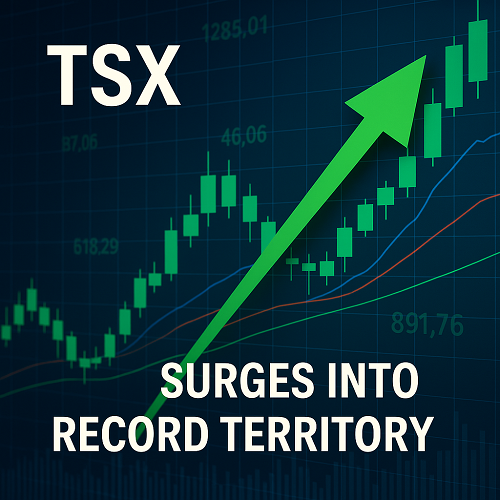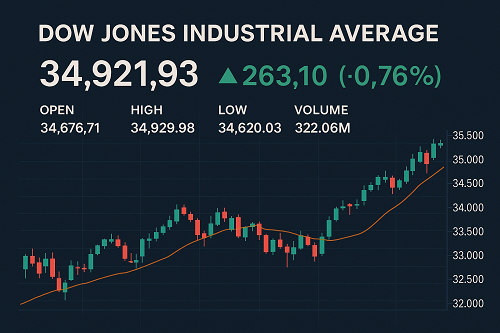Canada’s S&P/TSX Composite Index has recently broken into record territory, leaving many investors, analysts, and media asking: What’s fueling this rally, and can it sustain? This article dives deep into the macro drivers, sector performance, risks, and trading opportunities underpinning the move. Whether you trade equities, forex, or crypto, understanding the TSX’s trajectory is essential in a globally interconnected financial landscape.
TSX 2025: A Snapshot of the Breakout
As of mid-2025, the TSX has smashed past its previous all-time highs, gaining robust momentum. Recent sessions have reflected advances of several percentage points in a single day, pushing the index firmly into new territory.
Over the year to date, the TSX’s returns are outperforming many global benchmarks — partly owing to Canada’s commodity exposure and relative macro resilience.
| Metric | Approx. Level / Change |
|---|---|
| YTD TSX performance | + ~15-20% (varies by tracking) |
| Recent daily moves | +1% to +1.3% surges on strong sessions |
| Sector strength | Materials, Mining, Energy |
| Currency | CAD hovering ~0.72–0.75 USD range |
Key Drivers Behind the Rally
Monetary Policy & Interest Rates
Monetary policy remains the linchpin. When markets anticipate rate cuts or increasing dovishness, investors tend to rotate toward equities, especially those with growth or leverage to rate sensitivity.
- In the U.S., speculation about a September rate cut by the Federal Reserve is feeding optimism.
- Meanwhile, Canada’s central bank may lag, but Canadian equities benefit from positive spillovers and favorable interest spreads versus global peers.
- Lower rates boost risk appetite, making leverage and speculative sectors more attractive.
Commodities & Energy Cycles
Canada’s market is heavily weighted toward natural resources, making this rally partly a commodities story:
- Rising gold, copper, uranium, and base metal prices have driven gains in mining stocks.
- Energy prices, while more volatile, also contribute when supply constraints or geopolitical risk push oil & gas higher.
- The materials + mining sectors enjoy strong tailwinds as global demand for decarbonization, infrastructure, and EV minerals intensifies.
Earnings Momentum & Corporate Health
The rally is not purely technical or sentiment-based — strong corporate results play a role:
- Many TSX-listed firms have delivered beats, especially in resource, financial, and telecom names.
- Profit margins remain relatively resilient despite inflationary pressures.
- Capital discipline, cost controls, and strategic investments in green or alternative energy are adding to investor confidence.
Currency Flows & Global Participation
Foreign capital inflows and currency dynamics amplify the impact:
- A weaker U.S. dollar or stronger commodity currencies makes Canadian equities more attractive to international investors.
- Resource stocks denominated in U.S. dollars benefit in Canadian-dollar terms when commodities rise.
- Institutional and ETF flows are tilting toward Canadian equity exposure as part of global rebalancing.
Technical & Sentiment Drivers
Psychology and chart dynamics are catalytic:
- Breakouts above prior highs trigger momentum buying — mechanical algorithms, trend-followers, and breakout speculators pile in.
- Market breadth (number of advancing stocks) has widened, reducing the risk of narrow-lift breadth traps.
- Sentiment indices show increased risk appetite, especially among institutional and retail participants.
Sector Analysis: Who’s Leading and Why
Materials & Mining
This is the clear standout. Metals like gold, copper, lithium, nickel, and others are seeing robust demand. Major miners are registering 5-10% daily gains in some cases.
Strength in this sector is magnified by the “clean energy transition” narrative, making it part macro trade, part thematic.
Energy & Natural Resources
Energy is more cyclical and faces headwinds (like regulatory risk and global demand cycles), but when oil rallies, it delivers outsized upside to select names.
Financials & Banks
Canadian banks with asset-light, fee-driven models are benefiting from a rising equity market and improving credit conditions. However, they are more rate-sensitive.
Technology & Growth Stocks
This is still a smaller slice of the TSX, but growth names tend to amplify rate-sensitive rallies. As interest rates soften, we might see rotation into more speculative parts of tech and innovation.
Defensive & Yield Plays
Utilities, REITs, telecoms, and high-yield dividend names are playing a hybrid role: safe-haven appeal with income, but relatively underperforming in a risk-on regime.
Risks and Overhangs to Watch
Inflation & Central Bank Surprises
If inflation reaccelerates, central banks could delay cuts or shift hawkish again, unravelling equity gains.
Global Macro Shocks
Events like geopolitical flare-ups, supply chain disruptions, or systemic credit stress can reverse momentum swiftly.
Valuation Stretch & Market Rotation
As valuations become taut, a rotation away from overbought sectors into value, cyclicals, or other geographies may occur.
Political & Regulatory Tailwinds or Headwinds
Policy shifts — e.g., carbon regulation, mining royalty changes, taxation — can impact major players quickly.
Trading & Investment Strategies
Tactical Equity Plays
- Momentum breakout plays: Ride trending names in miners, energy, or leverage.
- Pullback entries: Use re-tests of breakout levels or moving averages to enter.
- Sector rotation: Monitor leading and lagging sectors for rotation signals.
Hedging with Forex & Currency Pairs
- Express bullish/neutral risk via CAD/USD pairs: if you expect the Canadian dollar to strengthen with commodity support, consider long CADUSD.
- Use currency hedges when holding U.S. equities or foreign exposure.
Crypto & Alternative Angles
- In risk-on regimes, crypto may benefit from carry-over liquidity — but volatility is higher.
- Consider crossover trades: pairing high beta crypto with equities (hedged or unhedged) in correlation strategies.
ETFs, Derivatives, and Leveraged Products
- Use TSX-based leveraged ETFs (with caution) to magnify returns (or losses).
- Options strategies: buy calls on strong sectors; sell covered calls to capture income while participating in upside.
- Use sector ETFs (materials, energy, mining) to gain diversified exposure with less idiosyncratic risk.
Case Studies: Notable Movers
Gold & Base Metals
Companies like Barrick, Kinross, etc., have delivered strong gains amid surging gold prices.
Energy Majors
Integrated energy names with assets in Canada have delivered on favorable global pricing and local projects.
High-Volatility Small Caps
Junior miners and exploration plays often see wild swings — for those with proper risk management, these can offer outsized returns.
Outlook & Scenarios for End of 2025
Base Case
Moderate equity gains (5-10%) in TSX, continued commodities support, some rate easing in the U.S., slow global growth but enough demand.
Bull Case
Stronger rate cuts, stimulus, commodity supercycle continuation — potential 15-25% further upside.
Bear/Correction Case
Rate surprises, inflation shock, external crisis — can trigger 10-15% pullback or worse in the short/medium term.
How to Stay Ahead: Tools, Metrics & Monitoring
- Breadth indicators: Advance/decline line, new highs/new lows
- Commodity indices: Gold, copper, lithium tracking
- Currency trends: CAD/USD, commodity-currency correlations
- Volatility & sentiment: VIX-equivalents, put/call ratios
- Macro and central bank cues: Inflation, GDP, rate decisions
- Corporate forward guidance: Earnings reports, outlooks
Conclusion
The TSX’s move into record territory in 2025 is not an accident — it’s the confluence of favorable monetary expectations, commodity strength, corporate resilience, and positive sentiment. But no trend is inexorable. With sharp eyes on inflation, central banks, and global macro shocks, the path forward may include sharp twists.
For traders and investors alike, this is a fertile time — but one that demands discipline, diversified strategies, and rigorous risk control. Those who navigate it thoughtfully stand to benefit greatly.





 XAUT-USD
XAUT-USD  AMD
AMD  MARA
MARA  SHOP
SHOP  BULL
BULL  CL=F
CL=F